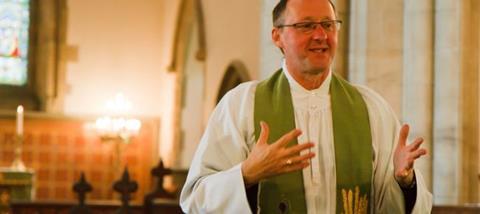
This past weekend the headmaster of Eastbourne College complained that "stifling" rules and red tape is forcing him to vet the sermons of visiting Christian preachers.
Tom Lawson told the Mail on Sunday that in the past year he has been forced to check in advance the texts from a Church of England bishop who preached at a confirmation service, and from the Reverend Stephen Grey, senior chaplain at Eton, in order to comply with government anti-terrorism measures.
He was also unhappy about the more general administrative burdens placed on the school by the Prevent strategy – a series of government initiatives aimed at countering extremism. These measures were brought in with the good intention of trying to cut off at source any teaching or ideology that would lead to unlawful and harmful behaviour, including acts of terror.
Whether or not vetting sermons is an actual requirement under Prevent is debatable; we do not know whether Mr Lawson was asked to vet the sermons or whether it was his interpretation of the legislation that led him to do so.
But this story does raise serious questions about the attitude our society has to Christianity and why anyone might consider a Christian sermon a possible source of extremism.
What is there in the plain explanation of the Bible's teaching that could incite acts of violence or murder?
Do people in the UK today genuinely think orthodox Christianity is dangerous?
Perhaps they do. Or is the problem simply that our state institutions (including schools) have become paranoid. They fear being labelled as holding, or at the very least tolerating, views that are now considered to be dangerous or illegal under new anti-terror or equalities legislation.
Christian preaching should be a faithful explanation of the message of the Bible, applied carefully to life. It is not for the state to decide what is acceptable for God to be saying to people. Distorting the meaning of the word of God is a long-established practice of those designated as 'false prophets' in the Bible.
Christian sermons will affirm some things in our culture and challenge others
Good preaching is radical in that it challenges our assumptions and behaviour and calls us to repent and to believe in Jesus Christ. It gets right into our hearts and by the power of the Holy Spirit roots out wrong ways of thinking about ourselves and about God, and it transforms our behaviour. We become radicalised, but not in order to commit acts of terror but acts of love. We want to serve others by speaking and living the good news of Jesus Christ. You can’t get more radical than that!
Faithful biblical preaching does say things that are hard to accept at first, things that change our way of thinking and living. But it never calls us to do anything that will endanger our fellow citizens. Christian sermons will affirm some things in our culture and challenge others. They will confront family, friends and others with the need to turn to Jesus, but will never seek to coerce, compel or manipulate people – it is God’s gracious call to us all to come to him.
Jesus Christ calls his followers to extreme love for God, his word of truth in Christ, his gospel, his people and his world and we need to keep preaching that message despite attempts to censor us.
Graham Nicholls is the director of Affinity
Click here to request a free copy of Premier Christianity magazine




























